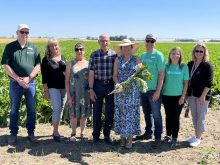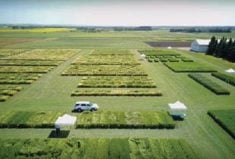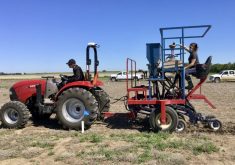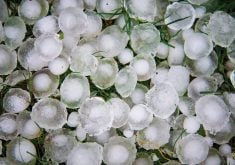The shop is in a building built seven decades ago and shows its age.
It’s a hike from there to the rented office space in the local municipal district building, which is full at the best of times and overflowing when farmers or summer students show up. Most importantly, worn-out facilities and rented land are a huge barrier to doing research that can make farming in the Peace more profitable.
Now a new day is dawning for Sarda Ag Research, which expects to move into a new building on 10 acres of donated land next spring thanks to a $750,000 grant from a farmer-funded research agency.
Read Also

Taking the farmers’ market online
Two Albertans, who have a cow-calf operation near McRae, had the idea to create Arvo, an online farmers’ market, after being unable to find beef from within their own community.
“We’re quite excited,” said Vance Yaremko, manager of the Peace Country research organization. “We hope this opens the door to have more community involvement.”
The Western Grains Research Foundation is pretty pumped, too, said chair Keith Degenhardt, a pedigreed seed and cow-calf producer from Hughenden in east-central Alberta.
“We were quite pleased to accept their proposal and fund it,” said Degenhardt. “This will really add to the strength of the producers in the Peace area, and they will be able to bring onto their farm some of the new research going on up there.”
The new shop and office will be in a $960,000 building near the village of Donnelly, just west of the current location in Falher and about 70 kilometres northwest of High Prairie. The organization plans to lease additional acres and will use 10 acres near the building for long-term plot work.
“It will give us that assurance that long-term trials can stay in place without some of our lease land being sold,” said Yaremko. “It gives stability to longer-term trials.”
A previous eight-year trial had to be abandoned when the land was sold, he added.
The new building will be called the Advanced Agriculture Research Centre of Excellence and is expected to be a hub for ag research in the Peace. Yaremko said lots of farmers will pass by on their way to nearby elevators because the building is right beside the highway.
“We’ll have a little more exposure.”
When farmers do drop by, there will be room to come in for a chat.
“When we started using the MD office, we had three people. Now we’re up to seven. We had no real room to expand or maneuver within our current space. We’re just trying to find a place where farmers will be able to come in and interact with us.”
However, the real advantage is having the proper tools to do the work and do more of it, said Degenhardt.
“They’re looking at really expanding their ability to do both their applied research as well as their extension work,” he said. “We invested the dollars because we think it will be a real gain for the producers up there.”
Sarda’s work includes variety testing, fertility trials and monitoring of pests such as bertha army worm and pea leaf weevils, which have started to move into the area.
“We’ve been involved with some of the work done on pea inoculants, and we’ve been working for the last six years with industrial hemp, on the fibre and seed piece,” said Yaremko.
“This year, we just started working a little bit on lupins, since this was something that farmers in the area were introduced to.”
The organization also has a large forage seed program.
“When the government let go of all their specialists, we retained the forage seed specialist in Alberta,” said Yaremko. Calvin Yoder now works for Sarda and the Peace Region Forage Seed Commission and continues to run a forage seed program.
“We have gone through many changes, and we have tried to be able to be progressive up here doing research work,” said Yaremko. That’s not easy in the Peace.
“We’re not like other parts of the province where we have support from Ag Canada or the post-secondaries,” he said. “Ag Canada has had budget constraints and has been stuck in a small area, and Alberta Agriculture has walked away completely.
[RELATED] Squeezed and struggling: Research groups desperate for funding
“We’re just trying to fill the gaps as best as we can to help producers be a little more profitable.”
The new building could bring new possibilities, such as sharing equipment with the North Peace Applied Research Association.
“It’s very difficult to get capital dollars, especially for buildings,” said Yaremko. “When this grant was open, it didn’t have limitations for bigger projects like the one our group needed.”
The Western Grains Research Foundation was founded four decades ago by a dozen farm organizations and puts more than $12 million annually into crop research projects. It gets its money from a variety of sources but a key one today is checkoffs from cereal groups, including Alberta Wheat and Alberta Barley.
“There have been some significant changes in terms of research capacity and where it is occurring and so forth,” said Degenhardt. “As a funder of research across Western Canada, we don’t want to lose capacity if we can help it.”
















